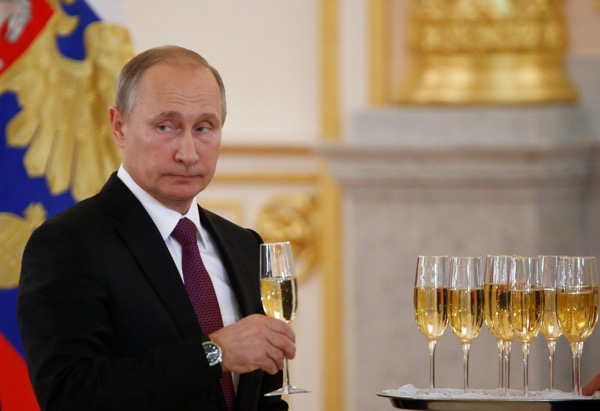
On the night of Donald Trump’s inauguration as US President, champagne corks popped in Moscow.
Literally, on the floor of the Russian parliament, MPs cracked open bottles of sparkling wine and toasted his victory.
The thing is, they saw Trump’s victory as their victory, too. And why wouldn’t they? As presidential candidate, Trump promised to turn US policy towards Russia on its head.
He criticized Russia’s Cold War nemesis, NATO, a mainstay of US military power in Europe. He had spoken of working with Russia in Syria, where Moscow supports Bashar al-Assad, whom Washington opposes.
Trump hinted at easing painful sanctions imposed by Washington on Moscow over its intervention in Ukraine, even at recognizing Russian sovereignty over Crimea — the Ukrainian territory annexed by Russia in 2014.
close dialog
Wrong.
In fairness to Russian lawmakers, it didn’t take long for the high hopes to fade and for the disillusionment to set in.
State television was fawning in its Trump coverage in the early months of his presidency, only to abruptly drop all mention of the man once it emerged the widely anticipated détente in US-Russian relations wasn’t going to happen.
Trump’s failure to deliver on his promises about Russia — amid congressional and federal investigations into members of his administration potentially colluding with Russian actors interfering with the 2016 election — and the tightening of US sanctions all came as a bitter disappointment to the Kremlin. Trump has consistently denied any collusion with Russia.
Despite Trump often praising the Russian leader, those around President Putin always said they never viewed the incoming Trump administration with rose-tinted spectacles.
But behind the Kremlin’s walls, hopes had clearly been dashed.
“What we see is merely the growth of anti-Russian hysteria,” he told me.
“And, yes, I regret it,” he added, “because acting together we are more able to solve the acute problems that exist in the world.”
Even in July, Putin understood that the Russian dream of a sympathetic US president who would help Moscow restore its status as a major power was slipping ever further out of view.
In the next few weeks, the US Congress is expected to consider a further ratcheting up of economic sanctions against Russia and the Mueller probe may yield ever more clarity on Russian meddling in US politics.
So if Moscow is going to mark the first anniversary of Trump’s entering the Oval Office, we can be certain of one thing: It’s unlikely to do so with a celebratory glass of fizz, or with any sense of optimism in the air.
Leave a Reply
You must be logged in to post a comment.